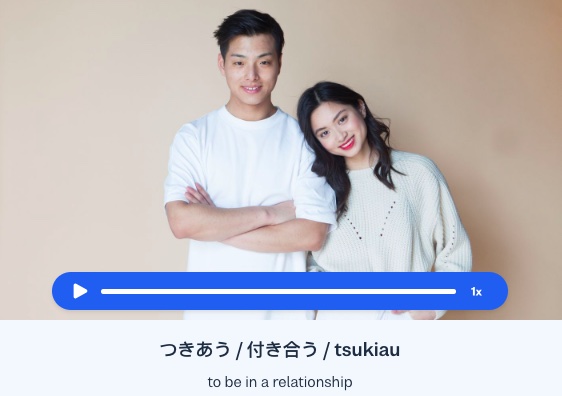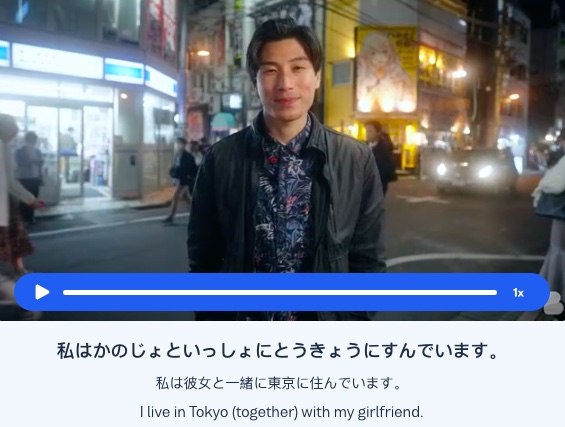How to Say “I Love You” in Japanese (And Why You Shouldn’t)
Learn the different ways of expressing your feelings or appreciation in Japanese.
I want to learn...
Ahh, love. Who doesn’t love love? So it’s no wonder people are always looking to learn to say I love you in different languages. But in Japanese, saying “I love you” is… a little complicated. Don’t worry, we’ll explain.
Something you learn quickly when you learn Japanese is that a lot of Japanese language is a little indirect, both out of politeness and just the structure of the language. People are more likely to respond ‘maybe’ or ‘a little bit’ when they mean ‘no’, and anata, the pronoun for ‘you’ is rarely used in regular speech (except romantically, which we’ll get to later).
So, as you might imagine, telling someone you love them (or anything!) directly can be jarring. It doesn’t really gel with the Japanese style. Instead, it’s more common to say ‘I like you’ or ‘I really like this’ where people from Western cultures might more casually toss around the word ‘love.’
Ready? Let’s dive in.
The short answer: I love you in Japanese
Ai – 愛
Meaning: love
Pronunciation: ah-ee (or “aye”, like a sea captain)
About: Does Japanese have a word for love? Yes. Love in Japanese is ai. The verb is aisuru (愛する), to love.
And to say I love you in Japanese, you would say aishiteru (愛してる).
Aishiteru is a gender-neutral term. So, to say I love you to a man, you’d say aishiteru yo, and to a woman, aishiteru wa. But – and this is a big but – it’s almost never used.
Seriously, don’t go tossing aisuru around in conversation. Aisuru is not for how you feel about a bowl of ramen, no matter how great that ramen is. It’s not the right word for asking someone to be your girlfriend. It’s a deep expression of emotion, usually reserved for the most romantic or heartfelt moments of a person’s life, and even then? It’s a lot. It’s for weddings, proposals, death beds, not as a thank you for doing the dishes.
Say this instead
Suki desu – 好きです
Meaning: I like (you)
Pronunciation: skee dehs
About: When learning Japanese, a lot of people ask, does suki mean like or love? Suki translates best to ‘like’, but it’s used in Japan to express that you’re romantically interested in someone. You can also use it to say that you like something, like food, a skirt, anything. Again, Japanese is highly contextual, so the object of your affection isn’t indicated in suki desu alone.
You can add specificity when not expressing your interest in someone by adding what you’re talking about – for example, ramen ga suki desu would be someone telling you that they like ramen, while staring deep into your eyes and saying suki desu… would probably not be about the ramen.
But if you’re looking to tell someone for the first time “I love you” in Japanese, suki desu is a good place to start.
Daisuki desu – 大好きです
Meaning: I really like (you)
Pronunciation: dah-ee-skee dehs
About: If you want to level up your expressions of affection, adding dai, which means ‘big’, at the beginning to make daisuki desu is a great way of telling someone you love them. Or telling your ramen that you really, really like it.
The full sentence, for someone you’re romantically involved with, would be anata ga daisuki desu, but again, even using anata is a little intimate. So, not for telling your Airbnb host family that you think they’re grand.
Some slangy options for the cool kids
Alright, so you can tell someone you have a crush on them with suki desu, or tell your boyfriend that you’re head over heels for him with daisuki desu, but like, what if you want to sound young and hip while you do it?
Don’t worry, we have you covered. Here are some slightly more casual ways of talking about love in Japanese. These are very much the kinds of phrases used by young people and TV characters, so use them sparingly if you want to actually express your feelings.
Suki yo – 好きよ
I like you, you know?
Suki da yo – 好きだよ
Love ya!
Daisuki da – 大好きだ
I love you!
Daisuki da yo – 大好きだよ
But I love you/You know I love you, right?
Suki yanen – 好きやねん
I like ya (Osaka/Kansai-specific dialect)
In short, you throw away the ‘desu’ and swap it for da, yo, da yo, or yanen. Da makes it casual and a little weaker, yo is like “you know?”, da yo adds emphasis or can be used to add a sense of contrast, like “but I love you!”
Other words and ways to show affection
Koi – 恋
Meaning: Love (romantic)
Pronunciation: koh-ee
About: There is another word for love in Japanese as well: koi. Koi as a noun refers specifically to romantic love, while ai is more about the concept of love in general. Koi generally has more of a connotation of wanting while ai is more giving. (You also shouldn’t use koi to ask somebody out, to be clear.)
Rabu rabu – ラブラブ
Meaning: Lovey-dovey
Pronunciation: rah-boo rah-boo
About: This is less a word for expressing your love and more for describing love – if a couple is being cutesy and affectionate, they’re being rabu-rabu.
Anata – あなた
Meaning: You, dear
Pronunciation: ah-nah-tah
About: Literally the pronoun for ‘you’ in Japanese, anata is rarely used in regular Japanese speech. You can use it for strangers, like to tell someone they dropped their wallet, but it’d be unusual to use it with someone whose name you know. The exception is that married people use it privately like we use “dear,” especially women talking to their husbands. (Men tend to use omae for their wives and close friends instead.)
-kun/-chan – くん / ちゃん
Meaning: Cutesy nickname (doesn’t translate)
Pronunciation: koon, chahn
About: These are suffixes you can add to someone’s name to express closeness and affection. Typically, -chan is added to the end of girls’ names and -kun to boys’ names. These cute nicknames are a kind of Japanese honorifics you can use with significant others and close friends.
Show, don’t tell
All of this doesn’t mean Japanese people don’t feel love as deeply! It’s just about how it’s expressed. In Japan, it’s much more common to show love through actions and gestures than to say it outright. Small gifts, going out of your way to spend time with someone (like taking the train past your stop), cooking, or planning a getaway – these are subtle actions that express love instead of saying it.
Love in Japanese writing
So, what is ‘love’ in Japanese kanji? The Japanese symbol for love is technically the one for ai – 愛. Your resident blog writer happens to think it looks like a lovelorn Romeo in a big hat professing his love but you be the judge.
And that’s everything you need to know to say “I love you” in Japanese
Love is a many-splendored thing, as they say, and now you can say it in Japanese!
Don’t stop now...continue learning more Japanese!
Learn more Japanese with Busuu, the award-winning online language course. Our bite-sized lessons are designed by language experts to help you reach your goals, on your own way, at your own pace.

